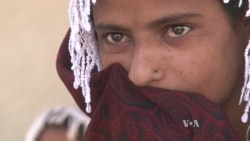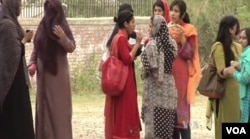In a village in the Umerkot district of Pakistan’s Sindh province, where Harya said she was kidnapped, hers was one of only two Hindu families. Her parents said she disappeared after going to fetch water from the village well.
A few hours later, her family tracked footsteps from the well to an influential household in the village, but was told she was not there. Later that night, they called the police.
It was not until a week later that some of the villagers told them what happened.
In another week, their daughter was presented in a local civil court and was declared a Muslim and the wife of the man who had abducted her.
Pakistan’s Hindu community complains that conversion and marriage is often used as legal cover for the kidnapping of young girls, who are allegedly threatened with harm to them or their families to get false statements in court.
Harya, the oldest of five siblings, stayed with her alleged kidnappers for a month and a half. She claims she was beaten and her so-called husband stole the jewelry she wore. She also said she was drugged when presented in court.
“A female police officer gave me some kind of an injection. Both the judge and the police were bribed,” she said. “They told me I was married. They also told me I was now a Muslim.”
Her parents spent everything they had, even sold their only buffalo for $1,000 to get their daughter back. A higher court finally ruled in their favor.
They have now moved from that village and Harya has stopped going out to fetch water.
Police say situation complicated
Hindu leaders say girls from poor communities are particularly vulnerable since influential Muslim men feel they can carry out a kidnapping without reprisal.
Multiple police officials throughout the district, however, said they were unable to take action because the situation was often more complicated than was presented by Hindu parents.
In most cases, they said, poor young Hindu girls eloped with more affluent Muslim men.
In such cases, police officials shared with VOA, it was common for both sides to lie to try and strengthen their case in the eyes of a judge.
Sonari, a Hindu girl who belonged to the poor Kohli community of Umerkot, said she fell in love with a Muslim man from the influential Halipoto community, and ran away from home to marry him. She claimed she was 21.
“I have married Shahnawaz because my parents were forcing me to marry a man I did not like,” she told a VOA team.
Since a Muslim is not allowed to marry a Hindu, she had to convert to Islam and now calls herself Zarina.
Her father, who lived only a few kilometers from her new home, insisted she was only 15, was kidnapped by Shahnawaz and afraid to tell the truth.
Ravi Dawan, the general-secretary of the All Pakistan Hindu Panchayat, explained that the concern of his community centered on girls who were too young to make life-changing decisions.
“What does a 12-13 year old know about love?” he asked. Girls between 12 to 18, he said, were often lured away with false promises and later threatened with harm to them or their families to force them to give false statements in court.
Often, he added, the parents are not allowed to meet them.
Converted and married the same day
Dawan also blamed Muslim clerics who have converted under-age girls in the absence of their parents, often performing their marriage the same day.
One such cleric is Pir Mohammad Ayub Jan Sarhandi, who claimed to have converted many Hindus in Umerkot. He denied that conversions took place under duress.
Whenever a male brought a girl to him for conversion, he said he took her aside, and even offered her protection from him and his family to ensure she made her decision freely, without fear or harassment. Once satisfied, he said he converted her, performed the marriage, and then called the local police.
He did not think it was necessary to call the police before performing the conversion or marriage, insisting such girls had ample time to make up their minds.
“She only leaves home once they both decide they can’t live without each other. They have already done their thinking,” he said.
He also acknowledged that some of those girls were under the legal age for marriage.
“They say a girl is not mature till she is 18. We condemn this law. We do not accept it. We will never accept it,” he said, reflecting the views of a majority of religious clerics in Pakistan.
The legal age for marriage is 16 in Pakistan and 18 in Sindh province. But some Pakistani clerics believe a girl is old enough to marry with her first menstrual cycle.
There is no legal minimum age in Pakistan for conversion from one religion to another.
Sarhandi denied that conversion would create a problem if the girl later changed her mind and wanted to go back to her parents, even though he accepted that according to sharia law, she would be then considered a murtid, or someone who leaves faith. The designated punishment for a murtid is death, according to many in Pakistan.
Instead, he said, the courts had a right to decide.
Dawani claimed dozens of Hindu girls were kidnapped every year and forcibly converted to Islam to marry someone.
Pakistani Hindus want any girl under 18 to be returned to her parents, even if she left home herself.
They are also pushing for a law that would make 18 a minimum legal age for conversion.







